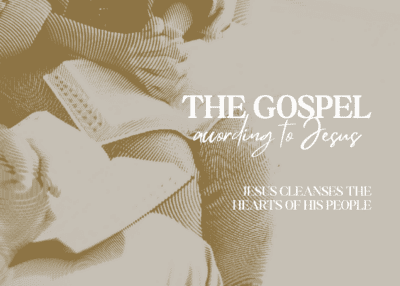It’s easy for modern Christians to scoff at the Pharisees. In the Gospels, they appear mean, petty, and vindictive.
Let’s be careful, though. The Pharisees were the religious leaders of their day, enjoying and abusing their power and prestige. Today’s church leaders face these same temptations.
But it’s not just leaders who need Jesus’s warnings. The Pharisees were honored in the first century, so those who weren’t Pharisees respected them. Therefore, at least some of the qualities Jesus rebuked in the Pharisees were present in the common synagogue member. If Jesus’s criticisms would have stung the average Jewish citizen back then, all Christians today should give full attention to his critiques.
Six Woes From Jesus
In Luke 11:37–54, we read some harsh words from Jesus. He was invited to dine at the house of a Pharisee, and the issue of pre-meal washing came up. Jesus offered this stinging rebuke.
Now you Pharisees cleanse the outside of the cup and of the dish, but inside you are full of greed and wickedness. You fools! Did not he who made the outside make the inside also? But give as alms those things that are within, and behold, everything is clean for you. (Luke 11:39–41)
Christians know that Jesus was perfect, but we seldom explore the details of his perfection. In this passage, Jesus levels six woes against the Pharisees and lawyers. As Jesus is the exact opposite of what he criticizes, we will see Jesus as the perfect religious leader and teacher.
Woe #1: Tithing
The first woe concerns the Pharisees and their tithes:
But woe to you Pharisees! For you tithe mint and rue and every herb, and neglect justice and the love of God. These you ought to have done, without neglecting the others. (Luke 11:42)
It’s an absurd picture—these socially powerful men gathered around a scale, removing a precise portion of garden herbs. And those hearts that cared deeply about the weight of mint cared little for God or neighbor.
Jesus was just the opposite. His entire mission was defined by justice and the love of God. His love for his Father compelled him in his quest to save sinners. Our holy God wanted to dwell with sinful people, and that could not happen without his just wrath aimed at those sins. Jesus came—as the perfect man—to solve this problem.
Woe #2: Reputation
In the second woe, Jesus focused on the Pharisees’ desire for acclaim and recognition.
Woe to you Pharisees! For you love the best seat in the synagogues and greetings in the marketplaces. (Luke 11:43)
As often happens with those in high positions, the Pharisees twisted the honor due to a leader into a hunger for praise. They were eager for people to flatter them and exalt them in religious and social settings.
Though Jesus deserved the seat of honor, he faced derision and scorn. He did not seek out popularity but associated with the lowly. And his earthly life ended in the shame of a bogus trial and a gruesome death. Jesus humbled himself to the point of death (Philippians 2:8) so that his people might be rescued and exalted.
Make no mistake, one day everyone will see Jesus in the best seat—his throne—but during his earthly ministry he sacrificed his own comfort, ego, and reputation for others.
Woe #3: Uncleanness
Jesus’s final woe against the Pharisees was the most severe:
Woe to you! For you are like unmarked graves, and people walk over them without knowing it. (Luke 11:44)
According to Jewish law, anyone who came into contact with a dead body or a grave was unclean (Numbers 19:11, 16). Since Pharisees were devoted to ceremonial cleanness, Jesus’s image of them was horrifying.
The mercy and power of Jesus are seen in sharp contrast to this picture. By his touch, Jesus made unclean people clean! (See Matthew 8:1–4, for example.)
Woe #4: Heavy Burdens
After the first three woes, Jesus focused on the lawyers in the crowd:
Woe to you lawyers also! For you load people with burdens hard to bear, and you yourselves do not touch the burdens with one of your fingers. (Luke 11:46)
It’s easy to see Jesus on the opposite side of this coin:
Come to me, all who labor and are heavy laden, and I will give you rest. Take my yoke upon you, and learn from me, for I am gentle and lowly in heart, and you will find rest for your souls. For my yoke is easy, and my burden is light. (Matthew 11:28–30)
The burden of following Jesus is one of dying to oneself. But this yoke is easy in view of the burden Jesus bore for sinners.
Woe #5: The Blood of the Prophets
This fifth woe is the hardest of the six to decipher (Luke 11:47–51). Jesus condemned the lawyers for building the tombs of the prophets, the same prophets whom their fathers killed. “So you are witnesses and you consent to the deeds of your fathers” (Luke 11:48).
Jesus goes on to say that “the blood of all the prophets…may be charged against this generation” (Luke 11:50).
If the lawyers approved of the death of the prophets, then they opposed the greatest prophet ever—the one standing before them. All the law and prophets pointed to Jesus, and the lawyers, who were supposed to be experts in the Scriptures, ignored these signposts. Because they despised the Son of God, their generation was guilty.
Woe #6: The Key of Knowledge
What is the goal of Scripture if not to point people to God?
Woe to you lawyers! For you have taken away the key of knowledge. You did not enter yourselves, and you hindered those who were entering. (Luke 11:52)
Jesus called people to follow him and worship the Father. He sought his Father’s presence and wanted the door to his Father’s house flung open for many. Jesus used the key of knowledge—understanding the nature and will of God—to bring people to God.
3 Applications
As we move from condemning the Pharisees to commending Jesus, we must realize the demands this passage makes on us. As people who are loved, saved, and secured by God, how should we respond?
- Don’t neglect your heart. It’s tempting to focus on our appearance, but God knows and cares about our hearts. He who made the outside also made the inside.
- Don’t mistake religious practice for love. We are often so consumed with the details of church activities that we miss the larger point. We should be giving, praying, serving, worshiping, and reading, but we must not neglect justice or the love of God.
- Invite others to God. The church is not a club or secret society, and the knowledge of God should be used to gather people, not scatter them.






